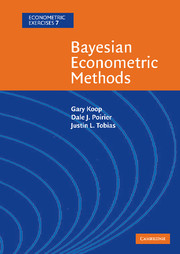Book contents
- Frontmatter
- Contents
- List of exercises
- Preface to the series
- Preface
- 1 The subjective interpretation of probability
- 2 Bayesian inference
- 3 Point estimation
- 4 Frequentist properties of Bayesian estimators
- 5 Interval estimation
- 6 Hypothesis testing
- 7 Prediction
- 8 Choice of prior
- 9 Asymptotic Bayes
- 10 The linear regression model
- 11 Basics of Bayesian computation
- 12 Hierarchical models
- 13 The linear regression model with general covariance matrix
- 14 Latent variable models
- 15 Mixture models
- 16 Bayesian model averaging and selection
- 17 Some stationary time series models
- 18 Some nonstationary time series models
- Appendix
- Bibliography
- Index
Preface to the series
Published online by Cambridge University Press: 05 June 2012
- Frontmatter
- Contents
- List of exercises
- Preface to the series
- Preface
- 1 The subjective interpretation of probability
- 2 Bayesian inference
- 3 Point estimation
- 4 Frequentist properties of Bayesian estimators
- 5 Interval estimation
- 6 Hypothesis testing
- 7 Prediction
- 8 Choice of prior
- 9 Asymptotic Bayes
- 10 The linear regression model
- 11 Basics of Bayesian computation
- 12 Hierarchical models
- 13 The linear regression model with general covariance matrix
- 14 Latent variable models
- 15 Mixture models
- 16 Bayesian model averaging and selection
- 17 Some stationary time series models
- 18 Some nonstationary time series models
- Appendix
- Bibliography
- Index
Summary
The past two decades have seen econometrics grow into a vast discipline. Many different branches of the subject now happily coexist with one another. These branches interweave econometric theory and empirical applications and bring econometric method to bear on a myriad of economic issues. Against this background, a guided treatment of the modern subject of econometrics in volumes of worked econometric exercises seemed a natural and rather challenging idea.
The present series, Econometric Exercises, was conceived in 1995 with this challenge in mind. Now, almost a decade later it has become an exciting reality with the publication of the first installment of a series of volumes of worked econometric exercises. How can these volumes work as a tool of learning that adds value to the many existing textbooks of econometrics? What readers do we have in mind as benefiting from this series? What format best suits the objective of helping these readers learn, practice, and teach econometrics? These questions we now address, starting with our overall goals for the series.
Econometric Exercises is published as an organized set of volumes. Each volume in the series provides a coherent sequence of exercises in a specific field or subfield of econometrics. Solved exercises are assembled together in a structured and logical pedagogical framework that seeks to develop the subject matter of the field from its foundations through to its empirical applications and advanced reaches.
- Type
- Chapter
- Information
- Bayesian Econometric Methods , pp. xv - xviiiPublisher: Cambridge University PressPrint publication year: 2007



